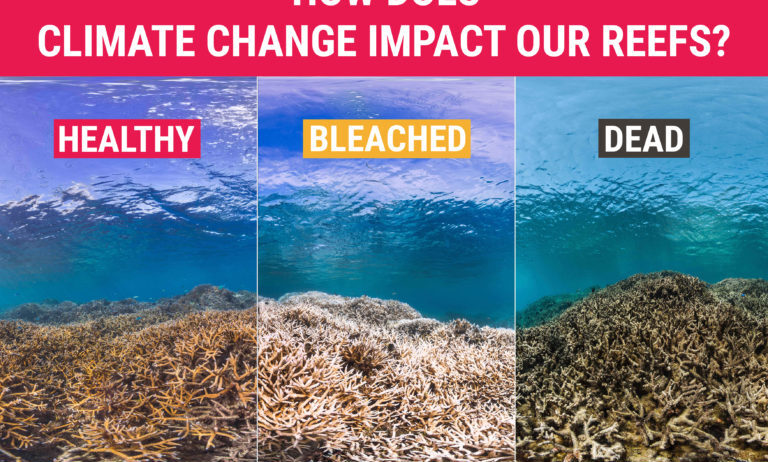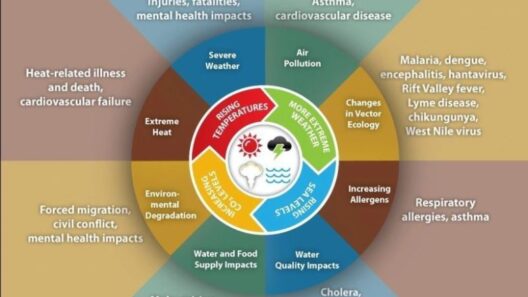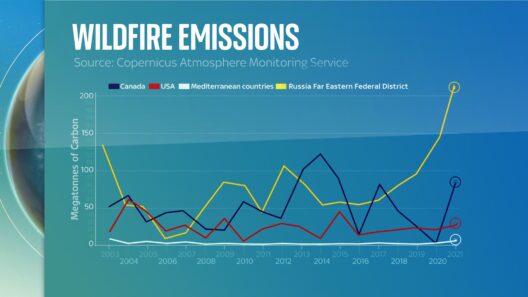Climate change is an inescapable reality that reverberates through every level of our ecosystems, manifesting with particular ferocity in the world’s oceans. The intricacies of marine life, from the enigmatic coral reefs to the modest cod, are deeply interconnected with the health of our planet’s climate. Understanding how climatic fluctuations jeopardize marine biodiversity unveils a compelling narrative where each species, no matter how diminutive, plays an integral role in the oceanic tapestry. This discourse aims to examine the multifaceted ways climate change endangers marine life, prompting a shift in our perception of oceanic health and our responsibility towards its preservation.
The oceans, covering over 70% of the Earth’s surface, are vital to sustaining life. They regulate temperatures, produce oxygen, and provide nourishment and habitat for countless species. Yet, as global temperatures rise and weather patterns become increasingly erratic, marine ecosystems face escalating threats. One of the most profound impacts of climate change on marine life is ocean acidification. As atmospheric carbon dioxide levels increase, approximately 30% of this gas is absorbed by the oceans, leading to a decrease in pH levels. This shift creates a more acidic environment, jeopardizing calcifying organisms such as corals, mollusks, and some plankton species essential to food webs. The diminishment of these foundational species signals cascading effects throughout marine ecosystems, threatening everything from intricate coral reefs to towering kelp forests.
Corals are particularly vulnerable to the vicissitudes of climate change. They are not merely picturesque structures that grace tropical waters; they are complex living organisms that provide habitat for numerous marine species. When water temperatures rise, corals undergo a process known as bleaching, whereby they expel symbiotic algae (zooxanthellae) that provide them with nutrients and color. Without these algae, the corals become stark white and lose their primary source of sustenance. Prolonged bleaching events often culminate in mass coral mortality, leading to the degradation of reef ecosystems that several fish and invertebrates depend on for survival. The international community has witnessed alarming levels of coral bleaching in recent years, underscoring the urgency of robust environmental actions to mitigate greenhouse gas emissions.
The plight of marine life is further exacerbated by the proliferation of harmful algal blooms, whose frequency and severity are influenced by climate change. Warming waters and increased nutrient runoff from terrestrial sources create ideal conditions for these blooms, which can produce toxins detrimental to marine organisms and humans alike. Fish and shellfish exposed to these toxins suffer from various health implications, and the resulting economic ramifications can be staggering for communities reliant on fishing industries. Moreover, harmful algal blooms can lead to the death of marine mammals and birds, demonstrating their far-reaching ecological consequences.
As we delve deeper into marine ecosystems, one cannot overlook the importance of fish species, such as cod, in maintaining the balance of oceanic food webs and human economies. Overfishing has long threatened these species, but climate change is adding a new layer of vulnerability. As ocean temperatures shift, many fish populations are migrating to cooler waters, often leading them into new geographical areas. Concurrently, this shift exacerbates competition among species and could destabilize fishing traditions that communities have relied upon for generations. The changes in migratory patterns disrupt age-old fishing practices and can lead to significant economic challenges for those dependent on fishery resources.
The intricacies of these changes open the door to questions about conservation and responsible management strategies. Societies must adopt a holistic approach to marine management that considers the interconnectedness of climate change impacts. Establishing marine protected areas (MPAs) is one strategy that can help mitigate these effects. Through the preservation of critical habitats like coral reefs and estuaries, MPAs can enhance the resilience of marine species against the ordeals of climate change. These sanctuaries allow ecosystems to thrive and adapt, offering a glimmer of hope in an otherwise bleak narrative.
Furthermore, technological advancements have empowered scientists and policymakers to monitor marine systems more effectively through tools such as satellite imagery and underwater drones. This data-driven approach aids in understanding how climate change impacts marine biodiversity and habitat health. With this information, communities can craft adaptive strategies tailored to their unique aquatic landscapes, thus fostering a more resilient relationship between humans and the ocean.
Education plays a pivotal role in cultivating a sense of stewardship over marine environments. Engaging the public in dialogue about the tangible impacts of climate change on their local ecosystems fosters a connection that can lead to proactive conservation efforts. Knowledge dissemination about the plight of marine species—from the grand migrations of whales to the delicate interactions of coral reefs—not only cultivates awareness but also ignites passion for actionable change.
The narrative of climate change and its implications for marine life is not solely one of doom and gloom; it is also a story replete with opportunities for innovation, collaboration, and communal action. As we strive to safeguard the intricate interdependencies within marine ecosystems, a broader understanding of climate change emerges—one that challenges us to reassess our relationship with the ocean and its inhabitants. The survival of species ranging from corals to cod hinges on our collective resolve to mitigate climate change and embrace sustainable practices. In this pivotal moment, the mantle of responsibility lies with us to forge a future where the ocean flourishes instead of flounders, ensuring that future generations can enjoy the boundless beauty and bounty of our blue planet.






